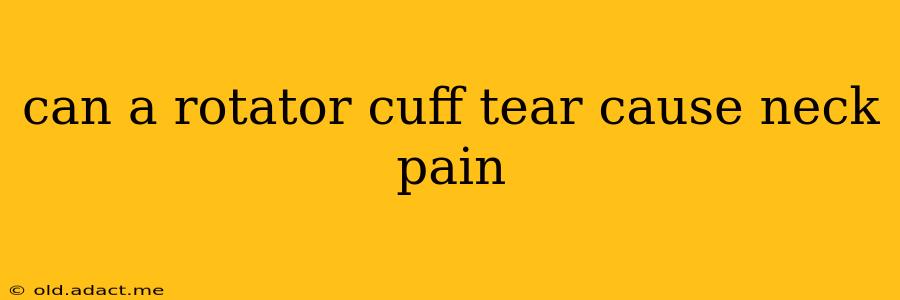A rotator cuff tear, a common shoulder injury, often causes pain localized to the shoulder. However, the intricate network of muscles and nerves connecting the shoulder, neck, and upper back means that neck pain can sometimes be a symptom, or a related consequence, of a rotator cuff injury. Let's explore this connection.
How Can a Rotator Cuff Tear Lead to Neck Pain?
The answer isn't a simple yes or no. While a rotator cuff tear doesn't directly cause neck pain, the body's compensatory mechanisms and the interconnectedness of the musculoskeletal system can lead to referred pain or secondary issues impacting the neck. Here's how:
-
Muscle Compensation: When the rotator cuff is injured, the body compensates by overusing other muscles to maintain shoulder stability and movement. This can strain muscles in the neck and upper back, leading to pain and stiffness. Muscles like the trapezius and levator scapulae, which are crucial for neck and shoulder movement, can become overworked and trigger pain.
-
Postural Changes: A painful shoulder caused by a rotator cuff tear often leads to altered posture. Individuals may hunch their shoulders or tilt their head to reduce stress on the injured shoulder. These postural changes can strain neck muscles, resulting in persistent neck pain.
-
Nerve Irritation: Although rare, it's possible for a severe rotator cuff tear or associated inflammation to indirectly irritate nerves that run through the neck and shoulder region. This nerve irritation can manifest as pain radiating from the shoulder to the neck.
-
Referred Pain: Referred pain is a phenomenon where pain is felt in a location different from its source. Nerves from the shoulder and neck often share pathways, meaning that pain originating in the rotator cuff might be perceived as neck pain.
What Other Symptoms Might Accompany a Rotator Cuff Tear and Neck Pain?
Experiencing neck pain alongside shoulder pain could indicate a rotator cuff problem. However, many other symptoms often accompany a rotator cuff tear. These can include:
- Shoulder pain: This is the most prominent symptom, often worsened with specific movements like reaching overhead or lifting objects.
- Weakness: Difficulty lifting or rotating the arm.
- Limited range of motion: Inability to fully move the shoulder joint.
- Clicking or popping sounds: Noises in the shoulder joint during movement.
- Swelling: Inflammation around the shoulder.
- Numbness or tingling: In the arm or hand, though less common.
Can Neck Pain be the Only Symptom of a Rotator Cuff Tear?
While unlikely, neck pain can sometimes be the predominant symptom of a rotator cuff tear, especially in the early stages or with less severe injuries. The pain may be felt more prominently in the neck due to referred pain or muscle compensation, overshadowing the shoulder pain. This makes proper diagnosis crucial.
How is a Rotator Cuff Tear Diagnosed?
Diagnosing a rotator cuff tear involves a thorough physical examination by a doctor or physical therapist, including assessments of range of motion, strength, and palpation of the affected area. Imaging tests, such as X-rays, MRI scans, or ultrasound, may be necessary to confirm the diagnosis and assess the severity of the tear.
When Should You See a Doctor?
If you are experiencing neck pain accompanied by shoulder pain, weakness, limited range of motion, or other symptoms described above, it's essential to seek medical attention. Early diagnosis and appropriate treatment can help prevent long-term complications and improve your recovery.
Is there a connection between rotator cuff injuries and cervical spine problems?
Yes, there can be a significant connection. Poor posture resulting from shoulder pain can strain the cervical spine (neck). Also, existing cervical spine problems can affect shoulder mechanics, potentially increasing the risk of rotator cuff injuries. The interaction is complex and requires a thorough medical assessment.
This information is for general knowledge and shouldn't replace professional medical advice. Always consult a healthcare provider for diagnosis and treatment.
